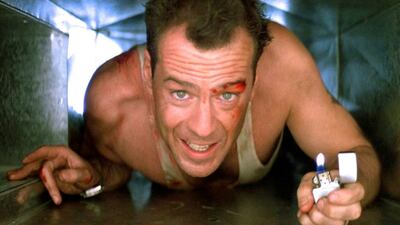Last week brought the tremendously sad news that Bruce Willis is stepping away from acting owing to health issues. Recently diagnosed with aphasia, a condition that affects cognitive abilities, it emerged that the star, aged 67, has been struggling with learning his lines and reacting to cues.
As the Los Angeles Times reported, Mike Burns, who directed Willis in the 2021 crime thriller Out of Death, was asked to reduce the star’s dialogue to lighten his workload.
The admission evoked an outpouring of sympathy online for Willis, as fans expressed their love for the actor whose career spans back to the 1980s. Back then, his breakthrough came as David Addison, the wise-cracking private detective, in TV’s comedy-romance Moonlighting. The show ran for five seasons, winning Willis an Emmy. By the time it wound up in 1989, Willis was a bona fide movie star — largely thanks to his role in Die Hard.
Even now, it’s hard to quantify the enormous impact Willis made in Die Hard as John McClane, the vest-wearing cop who single-handedly takes down a criminal gang raiding his wife’s workplace on Christmas Eve. Compared to the muscle-bound tanks such as Sylvester Stallone and Arnold Schwarzenegger, Willis was more grounded, more vulnerable. When he picked broken shards of glass from his feet, you felt every wince, every cry of pain. Here was a reluctant hero we could all relate to.
Willis played McClane a further four times, with diminishing returns, but here remained a character who changed action movies for ever. When you look at stars such as Dwayne ‘The Rock’ Johnson or Ryan Reynolds now — who boast similar everyman qualities — you can see the template that Willis first engineered. Like McClane, Willis was also a born survivor — even early '90s box office bombs such as Hudson Hawk and The Bonfire of the Vanities were not enough to derail his career.
director
Indeed, for all the smooth-talking schtick, Willis possessed a brilliant ability to reinvent his persona with edgy filmmakers — risks that paid off spectacularly. His role as the prize fighter Butch in Quentin Tarantino’s Pulp Fiction remains one of his most memorable parts; one minute he’s cooing softly to his girlfriend and promising her blueberry pancakes, the next he’s gunning down John Travolta’s hitman Vincent Vega in his own apartment and singing about “Captain Kangaroo”.
Perhaps even better was his turn in Terry Gilliam’s time-travel masterpiece 12 Monkeys, which came a year later in 1995. He plays James Cole, the sanity-threatened prisoner sent back from the future to stop a viral apocalypse. Gilliam wasn’t a big fan of Willis’. “I hated the Trumpian mouth he does in films,” the director later recalled, demanding that Willis dial down the smirking, a go-to staple for the actor. He did, with masterful results.
Others will doubtless point to M Night Shyamalan’s twisty supernatural tale The Sixth Sense, another huge hit in Willis’ career, in which he plays, with real conviction, a child psychologist who connects with Haley Joel Osment’s troubled boy Cole.
Yet, the same year — 1999 — Willis was also acting for the esteemed Alan Rudolph in his Kurt Vonnegut Jr adaptation Breakfast of Champions, as car dealership owner Dwayne Hoover. It didn’t quite land, but once again showed Willis’ penchant for gambling.
This continued into the 2000s, albeit less frequently. He found work with Richard Linklater (Fast Food Nation), Wes Anderson (Moonrise Kingdom) and Rian Johnson (Looper), directors who sculpted Willis’ movie-star persona into something interesting; unique. In Anderson’s case, he saw Willis at his most tender, as a police officer leading a search party for some runaways, in this nostalgic look at a bygone America. The New York Times rightly praised it as a “wonderful” performance.
Ever better, sci-fi Looper had Johnson tap into Willis’ stock-in-trade: “He’s typically the hero who is going to find the right person and kill them and save the day,” the director told me. Only this time, in a wild inversion, his time-travelling assassin discovers that his target is his younger self.
“He had no protective movie-star ego about wanting to look like an action star,” said Johnson. “He completely dove into this character.”
Recently, Willis’s career was reduced to generic B movies, such as Fortress and American Siege, producers banking on his movie-star charisma to sell their titles to the video-on-demand market, regardless of quality. The Golden Raspberry Awards even created a one-off category called ‘Worst Performance by Bruce Willis in a 2021 Movie’, nominating him eight times, which rather spoke to the volume of films he was churning out.
The Razzies rescinded the award, which went to his turn in Cosmic Sin, upon hearing of his diagnoses. Yet even in these fallow years, Willis found some gems — notably Motherless Brooklyn, Edward Norton’s 1950s-set detective yarn, and M Night Shyamalan’s Glass, which had Willis reprise his character from 2000’s Unbreakable — a superhero-style project that arrived long before they’d become fashionable.
That's Willis all over: a Hollywood trailblazer.










































